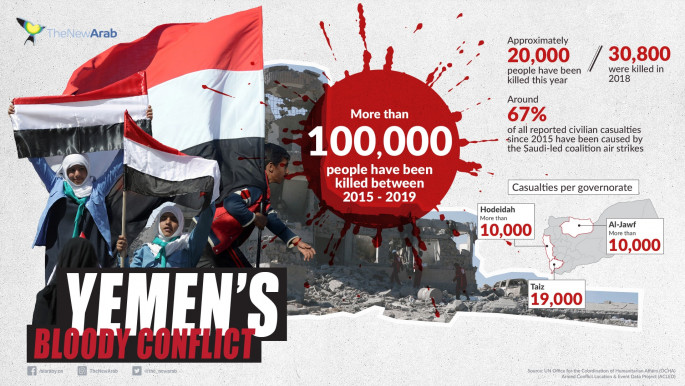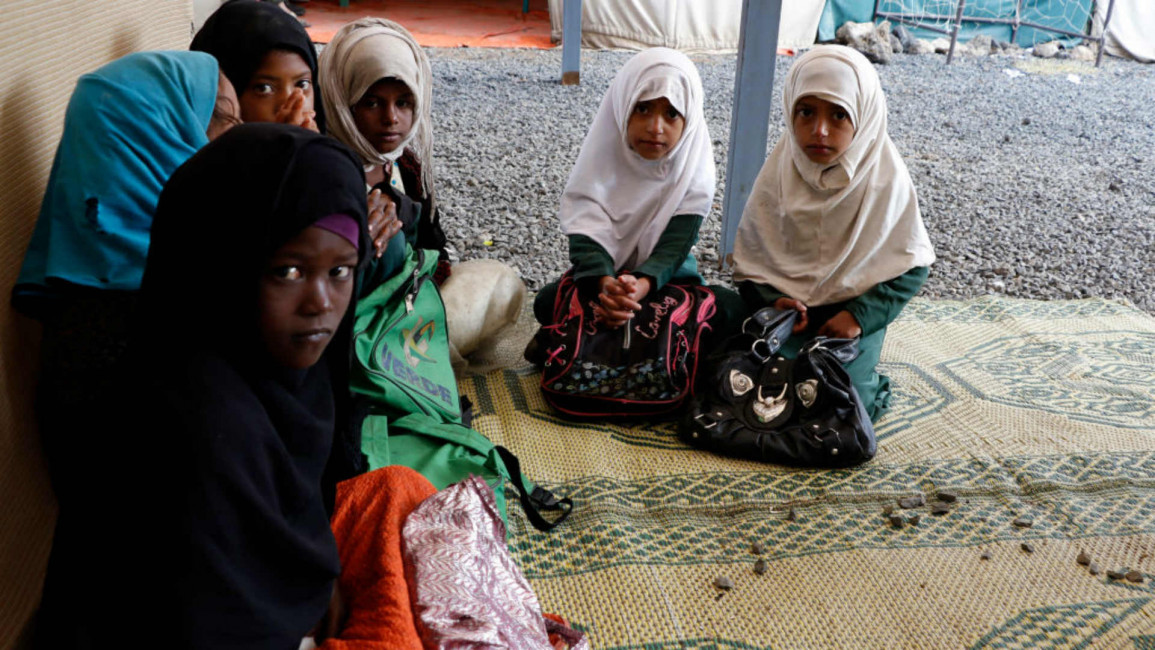
Yemenis face another year of war, and callous western silence
Over the last year, Yemen's hopes for peace have been dashed, and the country still faces unimaginable suffering from a war that will soon enter its sixth year.
None of the flawed diplomatic initiatives have successfully defused tensions enough to implement the deals, nor have those most responsible for the violence been held to account.
After Stockholm peace talks in December 2018, the United Nations attempted to bring the Houthis and the Saudi-backed government of Abdrabbuh Mansur Hadi into an agreement to protect the port city of Hodeidah, through which most of Yemen's imports and aid pass.
The Houthis were meant to withdraw from Hodeidah, handing it to international peacekeeping forces, along with a bilateral release of thousands of prisoners. Yet not only did the talks fail to go beyond the conflict's surface level symptoms, or address the underlying tensions driving the violence, they facilitated dialogue with just two of the rival sides in a much more complex conflict.
Painfully and predictably, the UAE-backed Southern Transitional Council (STC) launched a coup in Aden eight months later and successfully captured it, an inevitable consequence of ignoring the faction in peace talks.
Soon realising the obvious divergence in their Yemen strategies, Saudi Arabia and the United Arab Emirates sought to salvage their differences while retaining influence in Yemen. This led to a fragile truce called the Riyadh agreement on November, which was presented as a legitimate peace deal.
 |
Millions are at a heightened risk of starvation, as food aid cannot flow freely in Yemen due to violence and restrictions |  |
While Riyadh and Abu Dhabi desired a truce to preserve their alliance, the sides they respectively backed are still far more reluctant to accommodate each other.
Both accuse each other of disrespecting the deal. Deadlines to achieve an equally representative 24-member cabinet, as well as a governor and security director for Aden, were missed. Arguably both sides still want control over the south, with the STC prioritising southern independence, even if it means rejecting the deal.
Imposing such a deal from the outside is destabilising in the long-term. Unidentified attackers have increasingly targeted STC figures in recent weeks, while the presence of smaller independent secessionist groups threatens STC hegemony.
Any future secessionist attempts will face opposition from all over Yemen, leading to more southern instability. Furthermore, Al Qaeda in the Arabian Peninsula (AQAP) could still manoeuvre in Yemen's south and stage more attacks, should violence involving the STC resume.
 |
|
| [Click to enlarge] |
Yet given continued UAE empowerment of the STC-aligned militias - and that there is no reason to believe it has renounced its ambitions for southern influence - the STC will be emboldened to push for more control, should the deal crumble.
Though full secession is unlikely in the near future due to opposition towards it, the country risks becoming further divided due to Hadi's inability to assert control over the country, and the gradual split between the north and south that has re-emerged during the war.
To even further complicate Yemen's crisis, the Riyadh agreement had excluded the Houthis, which will lead to more violence - a stark replica of the Stockholm Agreement's failure to include the STC in talks. In late December, Saudi Arabia continued operations in north Yemen, while the Houthis also fired missiles at the southern Saudi city of Najran.
Despite reported backchannel communication in recent months, Saudi Arabia is still far from comfortable with Houthi control over northern Yemen, particularly as the group grows closer to Iran. As a consequence, Riyadh will likely look to isolate the Houthis further, which could trigger another violent response from the faction.
 |
The UN must still come to terms with the deep-rooted motives and structural issues driving Yemen's violence |  |
Since its September 2014 insurgency, the faction has claimed to fight against corruption and external interference in the country's political developments and is likely to oppose further outside interference.
With tensions still high from all three main sides, one provocative move any of them could see a resurgence in violence.
Even with such obvious setbacks, UN emergency relief chief Mark Lowcock said in December that Yemen's war is showing promising signs of winding down in this coming year, due to supposed increased trust from warring sides.
Yet this is likely based on the fact that the violence has temporarily declined. The UN must still come to terms with the deep-rooted motives and structural issues driving Yemen's violence, which it has so far disregarded. Even if new initiatives do occur in the coming year, they will not achieve much unless they address these factors.
Twitter Post
|
The conflict has taken at least 100,000 lives in Yemen, although the real figure could be even higher. No significant measures have occurred to restore the shattered state and its infrastructure. Without a functioning healthcare system and sanitation facilities, diseases such as cholera still flourish, along with many other ailments.
Millions are at a heightened risk of starvation, as food aid cannot flow freely in Yemen due to violence and restrictions, and the collapse in Yemen's economy and currency have left many Yemenis poverty-stricken, unable to buy adequate food or medicine.
Saudi Arabia and the UAE have previously not delivered on their pledged sums of humanitarian aid, exhibiting a callous disregard for Yemenis' well-being. More preventable deaths will occur, particularly if the violence flares up again and prevents Yemenis from reaching support. Though international aid efforts may halt some decline in the humanitarian situation, they will address the symptoms, and any long-term improvements are rendered impossible as long as the war continues.
Saudi Arabia and the UAE share the most culpability in driving Yemen's instability; a country that remains divided and weak helps secure their own geopolitical influence. Such continued interference will make peace in Yemen impossible, while the world turns a blind eye to their actions.
Impunity from the western states who enable the Saudi-led war with vast military support will almost certainly continue in the coming year, even though its withdrawal it could end the war within weeks.
Boris Johnson, who won a comfortable majority in December's UK General election, continued weapons sales to Riyadh despite them being labelled unlawful in June by the UK's Court of Appeal. Furthermore Donald Trump, who has repeatedly vetoed Senate bills to end US support for Saudi Arabia's war, will be US president for at least the best part of the coming year; though the November presidential elections may usher in a new administration.
The unfortunate reality is, that while this support continues, the coming year could see peace become a more distant prospect for Yemen, given the lack of genuine initiatives to truly alleviate the violence.
Even less will be done to alleviate the suffering of Yemenis, who have already been neglected by the world. Unless those driving Yemen's violence are genuinely curtailed from doing so, and Yemenis themselves are given more of a voice in peacemaking, the country will descend into further instability that could take generations to fully recover from.
Jonathan Fenton-Harvey is a freelance journalist.
Follow him on Twitter: @jfentonharvey
Opinions expressed in this article remain those of the author and do not necessarily represent those of The New Arab, al-Araby al-Jadeed, its editorial board or staff.




